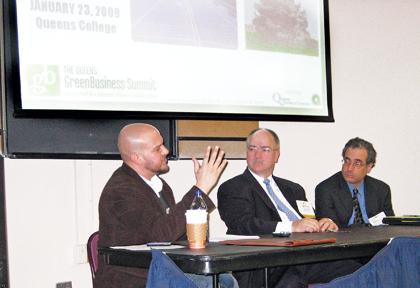By Jeremy Walsh
“If green is the new gold, local is the new green.”
Those were the sentiments of one of many speakers at the annual Queens Green Business Summit. Dozens of businesses gathered at Queens College Friday to learn about how to make their livelihood more earth−friendly in panel discussions and at information booths.
Among the topics were marketing, environmental law and recycling, but two panels during the day−long summit were taken up with sustainable business practices, including the local sourcing of materials.
Manhattan entrepreneur Stephen Salsberg opened the panel discussion by observing the rising popularity of green business practices over the last few years.
“It used to be most of the folks in the room used to be from the green community,” he said. “That change is inspiring.”
Salsberg urged business owners to buy local, be energy efficient and admit when they do not know about certain aspects of “greening.”
He also warned entrepreneurs about getting caught up in false promises of ecological soundness. He pointed out promises made by Ecotainer, a company selling specialty paper cups.
“It says on the label, ‘Made from 100 percent renewable resources.’ All paper is made from renewable resources.”
He also noted that while the cups are made to biodegrade in compost heaps, the city does not participate in composting.
“If I sell a yuppie a cup of coffee in that cup, I’m not only doing bad business, it’s not helping the environment,” he said.
Jamimia Payne, who runs a direct−mail retail business in the borough and works for Queens Economic Development Corp., said green, sustainable businesses pursue a “triple bottom line” of people, planet and profit.
“I think Queens is doing a great job,” she said, noting her organization gives out $29,000 a year in prizes to entrepreneurs who develop sustainable business plans. Last year’s winner of the contest established a consumer product business by sourcing all of her manufacturing in Queens, she said.
Michael Hurwitz, director of the Greenmarkets program, said that 80 percent of the farmers who sell their crops at the markets say they would be out of business if they had to deal with an intermediary.
“It’s keeping land in production instead of putting it in the hands of developers,” he said, noting that the markets only allow people to sell items grown, caught or gathered within 250 miles of the city to reduce the carbon impact.
Michael Schuman, research director for the national nonprofit Business Alliance for Local Living Economies, emphasized the importance of local sourcing.
“You cannot achieve greenness at the end of the day without being local,” he said, noting many businesses ignore local suppliers. “Many times you are failing to buy local because all of us have been brainwashed by millions of dollars in global advertising.”
James Kelly, a cost−saving consultant from Huntington, L.I., said many greening initiatives can save a business money, but many corporations have been skeptical of ecological awareness.
“I leave out the ‘you help save the planet’ part,” he said. “They think I’m crazy.”
Erica Brabon, an analyst with consulting firm Steven Winter Associates, urged business owners to start the greening process with an audit of their office practices, including recycling, turning off electrical appliances and installing energy−conserving light bulbs.
“When you have a baseline you’re operating at, you can start tracking it from there,” she said.
Reach reporter Jeremy Walsh by e−mail at jwalsh@timesledger.com or by phone at 718−229−0300, Ext. 154.
































